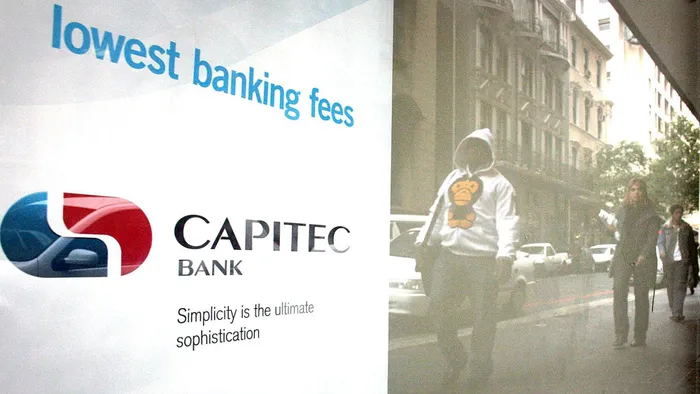Capitec’s share price nosedives after trading guidance leaves market unimpressed

Capitec Bank in the Cape Town city centre. Picture: Candice Chaplin
Lender Capitec’s share price took a nosedive on the JSE yesterday of almost 9 percent after it reported that it forecast an increase in its interim results, but much lower than the market had expected.
The share price closed the day 9.41 percent lower at R1 900.
However, in the past year the bank’s shares have increased by 10.35 percent.
In its trading statement for the half-year ended August 31, 2022, the bank said group headline earnings per share would be between 3 964 cents and 4 067c per share, representing an increase of between 15 percent and 18 percent.
The banks also flagged that group earnings per share would be between 3 963c and 4 064c per share, representing an increase of between 17 percent and 20 percent.
The muted interims come in the wake of stellar annual results released in April. For the year ended February 2022, Capitec reported an 84 percent growth in group headline earnings to R8.4 billion, representing an annual growth rate of 23 percent since 2012.
Mergence investment analyst Radebe Sipamla said the guidance range from Capitec indicated a big miss versus what the market was expecting.
Sipamla said: “This is what has driven the sell-off as Capitec traditionally has a high short interest, and any negative news flow benefits those with short derivative positions on the stock.
“The thing to bear in mind is that the Consumer Price Index (CPI) traditionally has a stronger second half of the year than the first half of the year, but even if you annualise this result it will still be below what the consensus is expecting for the financial year 2023 up 23 percent year-on-year or R89.74 per share.“
Sipamla said he thought the results were likely negatively impacted by higher costs associated with the ramp-up of the business banking operations, higher employee costs feeding through the first half of 2023 numbers due to the above-inflation increases that Capitec gave to its employees in the 2022 financial year.
He said there were likely higher front-loaded impairment charges that CPI has put through, given the inflationary pressures on consumers and higher rate hikes potentially negatively impacting loan repayments.
“It’s worth highlighting that CPI’s loan book has a bias toward government employees and state-owned enterprises employees who are generally less at risk from a potential retrenchment risk perspective, and CPI dynamically manages credit risk on a microscopic level,“ he said.
BUSINESS REPORT